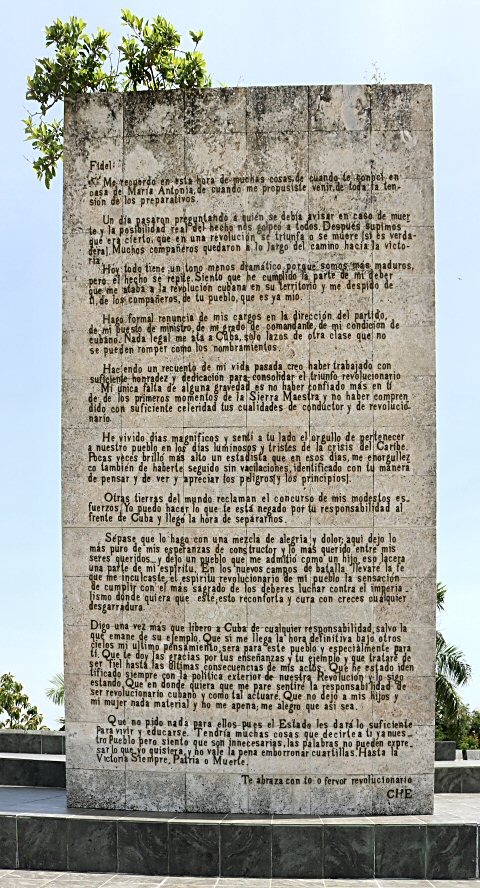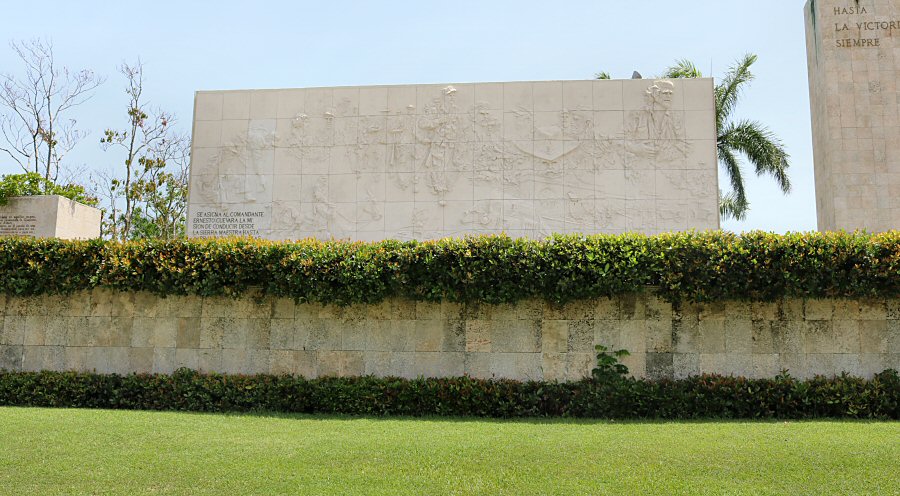Sculpture of Che. It is the work of renowned sculptor José Delarra. It was unveiled in 1987, in order to commemorate 20th anniversary of Guevara’s murder in Bolivia, although his remains was not found at that time.
The statue of Commander Che Guevara is 6,8 meters high (22 feet) and weighs 20 tons. It stands on a 16-meter-high pedestal. Ten meters of the pedestal are visible and covered with stone, and the last six meters are on the ground floor, covered with marble. Che's famous quote "Hasta la Victoria Siempre / Until Eternal Victory" is inscribed on the pedestal.
The statue is rotated to face San Juan Peak in the Escambray Mountains, where Che established his base and beyond to South America, where he decided to spread the revolution and aimed one united America.
Che, dressed in a guerrilla uniform, carries an M2 rifle in his right hand. His left arm is in a sling, as it was when he entered Santa Clara. The sling which Guevara wore during the battle was to immobilize an earlier broken arm. It also gives some clues about his personality, as he always claimed “a man rebelling even against himself.”
Mural. It is the work of the sculptor José de Lázaro Bencomo.
This monumental work, made of concrete, silica sand, and white cement, depicts many of the important milestones the revolution underwent on its way to victory.
As can be seen more clearly upon closer inspection, we see him in the Sierra Maestra consulting with Fidel, beside Camilo Cienfuegos; in the mountains on horseback; the invasion of Columns 2 and 8 to the west of the country; Che in the Escambray Mountains; the battle of Santa Clara; the capture of barracks 31; the derailment of the armored train; Che as the figure who liberated Santa Clara; Che in Guatemala and at the United Nations etc.
On the back of the mural is a map of Cuba showing the trajectory of the invasion of towns taken in combat by the joint forces of the columns.
Planters. Three planters are intended as a permanent tribute to Che Guevara. The larger one that is 6 m high, bears Che's full Farewell Letter to Fidel Castro which was written in Havana in March 1965 .
 On one side of it, there is Che's saying "La arcilla
fundamental de nuestra obra es la juventud / The fundamental
clay of our work is youth", referring the children in
schools. Young pioneers are depicted issuing the daily
salute that all Cuban children recite each morning "We will
be like Che". On the other side of the larger planter, there
are his words: "El trabajo voluntario es una escuela
creadora de concencias / Volunteer work is a school that
creates awareness", referring to Che's voluntary assignment
as Minister of Industry. Reliefs are created compatible with
these words.
On one side of it, there is Che's saying "La arcilla
fundamental de nuestra obra es la juventud / The fundamental
clay of our work is youth", referring the children in
schools. Young pioneers are depicted issuing the daily
salute that all Cuban children recite each morning "We will
be like Che". On the other side of the larger planter, there
are his words: "El trabajo voluntario es una escuela
creadora de concencias / Volunteer work is a school that
creates awareness", referring to Che's voluntary assignment
as Minister of Industry. Reliefs are created compatible with
these words.On the smaller planter on the left that is 2 m high, you can read Che is saying “Estaba en aquellos momentos en Guatemala, la Guatemala de Árbenz...Entonces, me di cuenta de una cosa fundamental: para ser médico revolucionario o para ser revolucionario, lo primero que hay que tener es revolución / I was in Guatemala at that time, Arbenz's Guatemala... Then, I realized something fundamental: to be a revolutionary doctor or to be a revolutionary, the first thing you have to have is the revolution.”
On the smaller planter on the right that is 2 m high, you read the counter-reply of Che Guevara at the 19th session of the United Nations General Assembly in response to anti-Cuban statements by representatives of Costa Rica, Nicaragua, Venezuela, Colombia, Panama, and the United States. “Me siento tan patriota de Latinoamérica de cualquier país Latinoamericano, como cualquier otra persona, y, si fuera necesario, estaría dispuesta a dar mi vida por la liberación de cualquier país Latinoamericano, sin pedirle nada a nadie, sin exigir nada, sin explotar a nadie. / I feel as patriotic about Latin America, about any Latin American country, as anyone else, and, should it be necessary, I would be willing to give my life for the liberation of any Latin American country, without asking anything of anyone, without demanding anything, without exploiting anyone.”
